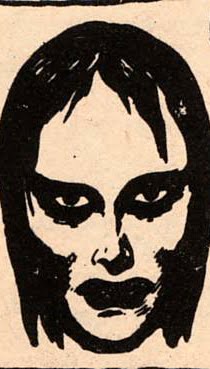Getting to Know... Davila 666
By Evan Minsker
Members: Carlito Davila (vocals, bass), AJ Davila (bass, vocals, piano), GiGi Davila (guitar), Johnny Otis Davila (guitar), The Latin Snake (drums), and Panda Davila (tambourine, maracas)
Album: Tan Bajo
For fans of: The Ramones, Menudo, The Black Lips
Davila 666 is more than just a Puerto Rican garage rock band. These guys are masters of making rock ‘n’ roll fun. On Tan Bajo, their latest, you can hear traces of girl groups, swamp blues, doo wop, power pop and ‘60s garage—and then they put the spook on it. The record is full of creepy voices buried beneath fuzzed-out rhythm guitars and fiendish vocals. (You don’t just adopt the name “Davila 666” without throwing some spooky shit in there.) But the most impressive thing about Tan Bajo isn’t its creepiness— it’s the hooks. The Davilas (surnamed a’la the “brothers” Ramone) have perfected the art of catchy songs. Now, they’re ready to show off those songs over two months of touring across the U.S. Paste spoke with singer/bassist Carlito Davila about the album, the tour and the unholy wedding of rap and rock.
Paste: When did you record these songs?
Carlito Davila: The record was recorded in May. We recorded some more stuff after that that will be out later in the year.
Paste: You already have more material that you’re planning on releasing this year?
Davila: Yeah. There’s more stuff that In The Red has put away for a little later in the year. I think it’ll be something just for the label. I think it’ll be an EP, probably. There’s nine songs. I guess that’s an album. It’s a short album; let’s say that. We sent Larry [Hardy] from In The Red a bunch of songs. We were going to take what’s left over and make some 45s, but Larry wanted to use all of them this time. He liked them a lot.
Paste: There’s one song on the record, “Yo Seria Otro,” that sounds like a girl-group song. Do you guys listen to that stuff?
Davila: Yeah, man. I’m heavy into that shit, man. That’s exactly what I had in my head when AJ, the bassist, came up with the bassline. Right away, that sort of melody came up in my head for that song. Yeah, it’s really supposed to sound like that—like some girl group, Phil Spector shit.
Paste: The album’s title translates to “so low,” correct?
Davila: Yeah, like “so low” in the sense of “lowlife,” I guess, but also in the sense of when you’re not feeling awesome and you feel low. [laughs] You know, something like that.
Paste: So, it’s sad, lowlife music?
Davila: Yeah, pretty much. It’s music to make sad lowlifes happy.
Paste: I love that a lot of writers have picked up your MySpace description of “Sounds Like: Menudo on lots of drugs.” Are you guys cool with that becoming your unofficial tagline?
Davila: Yeah, yeah! If you’re a person who knows what Menudo sounded like in the ‘70s and the early ’80s, we have songs that are really similar to that. Most of our songs. It’s really hooky. Everything’s a hook. It’s obviously more fucked up than that. But in real life, Menudo was more fucked up; they had all kinds of crazy shit happening to them. But music-wise, it sounds like a real strung-out Menudo.
Paste: I’ve also read people who said “Puerto Rican Black Lips.” Is that weird for you guys to read?
Davila: It’s weird. The Black Lips are our friends, you know? But they can tell you as well as we can tell you: We don’t sound alike. We do kind of the same thing where we take from the ‘60s and punk. But I’m not offended. It would be funny if someone wrote an article about them and said, “They sound like the American Davila 666.”
Paste: You’ve got a lot of singles out on a lot of great labels. Are there any labels you’d like to release stuff on?
Davila: Yeah, we’d like to put something on Goner Records; we really like Goner Records a lot. And Trouble In Mind; they’re from Chicago, they put out really good 7-inches. As far as new labels, we’d like to put out something on a label that’s not necessarily a garage label. If there’s anybody from an underground, independent label, even an independent hip-hop label… Because we do make a lot of songs with sample drums.
Paste: Would you ever want to collaborate with an MC?
Davila: Not on a song. [laughs] I have a strong thing against mixing rap music and rock music.
Paste: You’re against the historic merger of Run-D.M.C. and Aerosmith?
Davila: Yeah, man. I didn’t like it when it came out, either. And everything I hear that’s trying to fusion those two things together, it freaks me out.
Paste: Like all that Lil Wayne and Travis Barker stuff?
Davila: Oh man, that shit is horrible. Lil Wayne shouldn’t do any rock. Lil Wayne should rap. Anybody who says that he doesn’t [make great rap music] isn’t listening. But anybody who says he can make great rock music good isn’t listening, either. He’s really bad at that.
Paste: Any other plans?
Davila: I’ve got some side projects that I’d like to put out some singles, too. I’ve got a side project called The Oil Sheiks, and I’d like to put that out on some sort of label. Other people in the band, like GiGi and The Latin Snake have this other band called Ardillas, and they have an album coming out in a month or two. And if you’re having a really kick ass house party and you want us to play your house party, please call us, pay for our plane tickets, and we’ll play it for free, man. We just wanna play a fuckin’ house party. Davila 666's pop homage to garage
¿Cómo se dice the Black Lips en Español?
by Chad Radford
The raw and ragged din of garage rock, new wave and girl groups are as American as apple pie. Such primitive rock 'n' roll movements weren't exactly what Carlito Davila had in mind when he left his home town of San Juan, Puerto Rico, in the late '90s to find the Seattle music scene. But while visiting the States he got his first exposure to the music of Television, the Ramones, and the Killed By Death compilations of obscure ’70s and ’80s punk rock. "It was like nothing I had ever heard before," he recalls with a mild accent. "These people were making music because they had to, and it felt so real and honest and homemade to me, and I loved it."
That exposure planted seeds in Davila that would later bloom into his band Davila 666, a group many are calling Puerto Rico's answer to the Black Lips.
The sounds of modern Puerto Rico are defined largely by Latin hip-hop, bomba and reggaeton, and although a small enclave of punk and hardcore music exists in San Juan, the music Davila heard in the states was totally alien to him. When it comes to pop culture, Puerto Rico is a bit isolated, so by the time he made his way to Seattle, circa '96, the music scene he was looking for had come and gone. It was around that time that he met Erin Wood while working at Shop and Save.
"He was your average kid that you would meet at an inner city thrift store, one of the cool ones," recalls Wood, who now plays bass for Seattle punk band the Spits. "We worked in the electronics department downstairs, so we had free reign over the place. Our job was just to sit there and give the locals hell while listening to loud music."
Wood and Davila worked together for about a year-and-a-half before Davila moved back to San Juan. But before he left, Wood made him an epic 120-minute compilation tape. The two didn't speak for a few years, until one day Davila sent Wood a MySpace message that said "I owe it all to you, man. Check out my band!" Shortly thereafter, the Los Angeles garage punk label In the Red Records released Davila 666's self-titled debut. The album was an instant success with the label's followers, and has steadily gained steam throughout the States ever since.
Tipping their hat to the Ramones, the group's lineup, Carlito (vocals, bass), AJ (bass, vocals, piano), Johnny Otis (guitar) and Panda (tambourine, maracas) all go by the last name Davila. Everyone, that is, except drummer Sergio Navarez who is best known as the Latin Snake, a name that he earned due to what Davila calls his "venomous mullet."
From the opening howl of "el Lobo" and the razor-sharp riffs of "Basura," "Bla Bla Bla" and "Callejón," the album embraces the signature songwriting, grit and lo-fi production of cut-and-dry garage rock, while "Tú" rings with all of the fuzz and dreaminess of the Ronettes.
But what sets the group apart is an intensely refined pop sensibility. Since all of the songs are sung in Spanish, there's a language barrier that most Americans typically wouldn't be able to overcome. Yet the songs are so catchy and hook-driven that you can't help but sing along, even if you don't know what they're about.
"Before we think of the music as garage or punk or anything, it's pop music," Davila says. "I love the kind of song where once you hear the first hook you already have the rest of the song memorized, and when I write lyrics I do it phonetically. I wait until the song is done and then I write the words, just to keep it so the melodies are the strongest parts of the song."
The group's latest release, the "Pingorocha" y "la Diva Rockera" 7-inch on Atlanta's Douchemaster Records, show's the group's pop sensibilities becoming further refined.
"When the In the Red LP came out I thought it was an immaculate record, top-to-bottom perfection," says Douchemaster owner Bryan Rackley. "It was trashy and calculating, but it had mood changes, too, which is hard for most bands in this field to pull off. I thought it was one of the top records of 2008," he continues. "They sent me five songs and wanted me to pick the ones I wanted for a 7-inch, but I wanted them all. I asked if we could put them all on a 12-inch, but they had promised records to some other labels so I had to settle for three."
The songs on the Douchemaster single are more focused than anything on the album. They're clean, and a little tame by comparison but the power of their pure pop sensibilities are every bit as fresh and intoxicating as the music that inspired the group in the first place.
Davila 666
Tan Bajo
In the Red - 2011
7.7
For the right kind of fuzzed-out rock band, gaining a bigger audience doesn't have to mean leaving the garage. Sure, these days plenty of lo-fi acts-- from Wavves to Dum Dum Girls to Cloud Nothings-- have left the scuzzy sonics behind, as Pitchfork contributor Martin Douglas recently noted over at Passion of the Weiss. And it definitely works when, say, Smith Westerns embrace swooning Britpop balladry, because those Chicago glam-brats' songs already had a certain teen-dream sweetness to them. But their former tourmates Davila 666 are a different case. You wouldn't hire a big-budget remixer to scrub the grit out of "Wild Thing" or "Louie Louie", would you?
Like its Nuggets-crushing forebears, this Puerto Rican six-piece earns a place on your next house-party playlist with sheer anarchic energy, not to mention a formidable gift for language-transcending hooks. On Davila 666's underrated 2008 self-titled debut album-- plus a handful of vinyl-only releases for HoZac, Douchemaster, and Rob's House-- they established themselves as gleefully filthy purveyors of indecipherably catchy garage-pop. Thankfully, Tan Bajo doubles down on the group's strengths, delving deeper into screeching sonic chaos while adding an even more memorable batch of songs to shout along with, whether or not you understand the words.
That means Davila 666's sophomore album is still rowdy enough for an impromptu weekend binge with a few friends, but it also offers enough carefully crafted tunes and feedback-streaked textures to fill your headphones. Stylistic tropes from classic 1960s girl groups complement raucous guitar licks on harmony-drenched "Yo Seria Otro", with its call-and-response verses and touches of strings, as well as on waltz-time "¡Diablo!", with its brutally earnest spoken-word section. Meanwhile, the Velvets-JAMC scree explored on the earlier "Ella Dice" only expands on the hypnotically pounding "Si Me Vez..." or the instant-earworm advance mp3 "Esa Nena Nunca Regreso". When the band breaks into a full Ramones sprint on "Mala" or "Patitas", anyone with a playground-level knowledge of Spanish can still catch the gist: mierda, caliente, cerveza, cucaracha. That said, at plenty of times Davila 666 continue to delight in their inscrutability, as on the distantly crooned opener or the chocolate-jingle hidden track-- inside jokes, maybe? In any event, such dumb fun is a necessary part of what the train-whistling, irrepressibly hey-hey-ing "Los Cruces" reminds us, in a rare English-language moment, is only "rock'n'roll."
— Marc Hogan, March 21, 2011










































































































































No comments:
Post a Comment